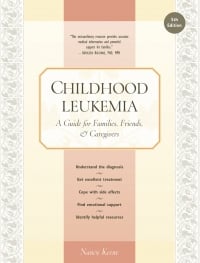Childhood Leukemia
Fatigue and Weakness
Fatigue, a feeling of extreme tiredness, is an almost universal side effect of cancer treatments. General weakness, although different from fatigue, is also caused by cancer treatment. Fatigue and weakness may be constant throughout therapy or may come and go. They can be minor annoyances or totally debilitating. Fatigue and weakness are usually caused by one, or a combination, of the following:
- Radiation therapy
- Your child’s body working overtime to heal tissues damaged by treatment and to rid itself of dead and dying cancer cells
- Medications to treat nausea or pain
- Mineral imbalances caused by chemotherapy, diarrhea, or vomiting
- Malnutrition caused by nausea, vomiting, loss of appetite, or taste aversions
- Anemia (low red blood cell count)
- Infections
- Emotional factors such as anxiety, fear, sadness, depression, or frustration
- Disruption of normal sleep patterns (common when hospitalized or when taking some chemotherapy drugs)
My son is almost 19 and is just beginning his third year of maintenance for ALL. He is a quiet and studious young man, has never dated, and does not go about partying and the like. The last three months, he appears to be all right, but he is, in his own words, always “exhausted.” In college and living in the dorm, he can get up in the morning at 6 a.m., but if he has two classes in a row, he is quite likely to fall asleep during the second class. He’s too tired to concentrate on homework for more than an hour at a time. Before diagnosis, a 50-mile bike ride was nothing to him. Even six months ago he could ride 30 miles, although he did feel some fatigue. Now, his beloved bike rests gathering dust. It breaks my heart that my son cannot feel the exuberance of young adulthood that I experienced at his age, but I am so very thankful that the treatment for leukemia has saved his life. I hope that when he is off treatment he will finally feel good again.
Following are suggestions from parents about ways to deal with fatigue and weakness:
- Make sure your child gets plenty of rest. Naps or quiet times spaced throughout the day help.
Erica took a 2 ½ hour nap every afternoon throughout therapy. She’s 4 now and off treatment, but her endurance is low and she still tires easily.
- Limit visitors if your child is weak or fatigued.
While in the hospital, my daughter was very weak. She had too many visitors, yet didn’t want to hurt anyone’s feelings. We worked out a signal that solved the problem. When she was too tired to continue a visit, she would place a damp washcloth on her forehead. I would then politely end the visit.
- Serve your child well-balanced meals and snacks, but don’t get upset if he doesn’t eat them (see next point about stress).
- Parents and children should try to avoid physical and emotional stress, whenever possible.
- Encourage your child to pursue hobbies or interests, if able. For example, if your child is too weak to play on an athletic team, let her go cheer the team on.
My eighth-grade daughter was a fabulous athlete prior to her diagnosis. When she went back to school after missing a year, she wasn’t very competitive, but she managed the softball team and dressed for basketball. So she was still part of the social scene and was able to do things with the teams.
Some children go through treatment without fatigue or weakness, but other children are not so lucky. The following stories describe two common experiences.
Before Brent was diagnosed at age 6, he was exceptionally well coordinated and a very fast runner. During treatment, he slowed down to about average. He played soccer and T-ball throughout, and was very competitive.
• • • • •
Jeremy has had some major, persistent problems with weakness and loss of coordination. When he was 9 years old, a year off therapy, he still could not catch a ball. When he ran, he was like a robot, and the trunk of his body stayed straight. Some kids made fun of him, and he got very frustrated with himself. He had lots of physical therapy, and now, three years off treatment, his skills have improved, but he still has to work harder than the other kids. We put him into martial arts in hopes of further increasing his motor skills and his confidence.
Table of Contents
All Guides- Introduction
- 1. Diagnosis
- 2. Overview of Childhood Leukemia
- 3. Acute Lymphoblastic Leukemia
- 4. Acute Myeloid Leukemia
- 5. Juvenile Myelomonocytic Leukemia
- 6. Chronic Myelogenous Leukemia
- 7. Telling Your Child and Others
- 8. Choosing a Treatment
- 9. Coping with Procedures
- 10. Forming a Partnership with the Medical Team
- 11. Hospitalization
- 12. Central Venous Catheters
- 13. Chemotherapy and Other Medications
- 14. Common Side Effects of Treatment
- 15. Radiation Therapy
- 16. Stem Cell Transplantation
- 17. Siblings
- 18. Family and Friends
- 19. Communication and Behavior
- 20. School
- 21. Sources of Support
- 22. Nutrition
- 23. Insurance, Record-keeping, and Financial Assistance
- 24. End of Treatment and Beyond
- 25. Relapse
- 26. Death and Bereavement
- Appendix A. Blood Tests and What They Mean
- Appendix B. Resource Organizations
- Appendix C. Books, Websites, and Support Groups

